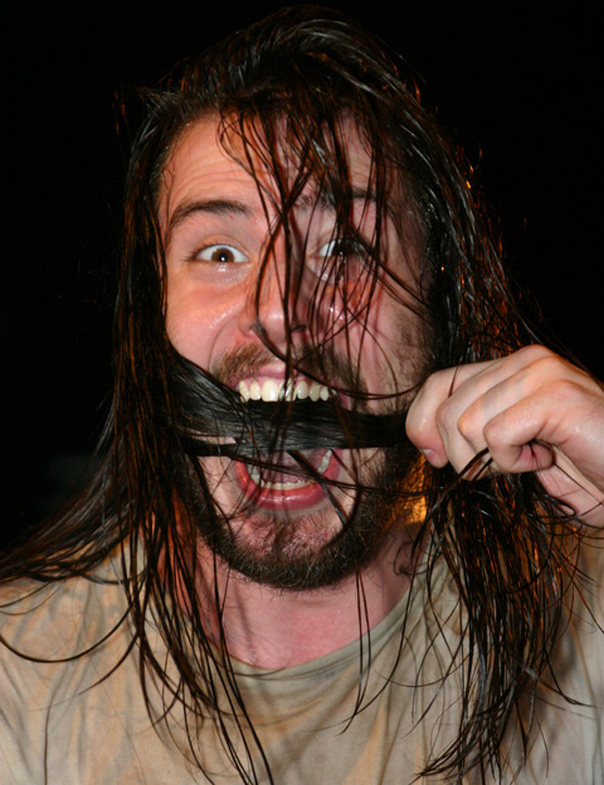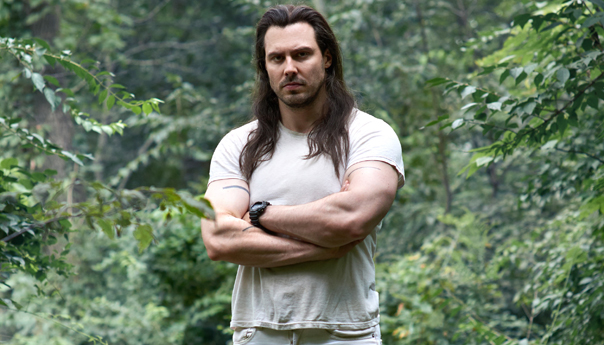Today with Andrew W.K.: Pee-wee-lover passes it forward

Andrew W.K. photographed at a show in Boise, Idaho, on Aug. 7, 2006. Photo: Gary Chancer
Last week we began a conversation with rock and roller—and serious partier—Andrew W.K. about his ongoing tour and upcoming album. In the course of our interview, we covered a lot more diverse topics, and as you would expect from a motivational speaker and advice columnist, his answers were too good to leave on the cutting room floor.
Andrew W.K.,
Shame Waves
8 p.m., Wednesday, Sept. 27
The Independent
Tickets: Sold out.
8 p.m., Thursday, Sept. 28
The Independent
Tickets: $25.
So please join us for the grand conclusion of our interview with Andrew W.K., whose tour is now in mid-season form. He plays two shows at the Independent next week.
RIFF: You have, let’s say, an eclectic body of work. You had a children’s show for a while. You had a popular advice column for The Village Voice. How does a musician become a writer?
Andrew W.K.: A music editor at Village Voice at the time, a great man named Brian McManus … reached out and said, “Hey, do you want to write an advice column for The Village Voice?” And I said, “OK.”
It should be noted, even though I say “yes” to these things, there’s often a lot of internal debate and struggle. Always a lot of doubt … about whether I’ll be able to do this job or whether I should do this. And in the old days I used to voice these doubts to people around me, people I considered friends. And I’ve quickly learned that’s not a good idea for all kinds of reasons.
For a long time I just would say “yes” and go against whatever doubts I had. … You have to end up trusting this really deep, interior, but often very quiet voice, and listen to what it’s telling you to do. And in the end, of course I’m really glad I did that even with the reservations that I had. It was a very rewarding experience for me. I learned from it. I don’t know if I did a good job or not. I try not to judge it past that and just try to keep looking forward, because otherwise I get very depressed very quickly. …
The kids’ show, that was this opportunity [that] came up. They said, “Would you ever want to host a children’s game show where you blow things up?” And I said, “Well, yeah, of course.” But I never would have had the nerve, or the imagination, perhaps, to dream up that kind of opportunity. So I feel very thankful to these people that took a risk on me and believed in me, or my potential of what I could do.
Do you have history as a writer? Did you surprise yourself with that, or is it something you’ve done?
I’ve done writing like anyone else had in elementary school and high school, and to a lesser extent after that. I wrote for fun sometimes, or I’d write things things for my own sake. I read things. I really enjoyed working in that format because I had a starting point. You have someone reaching out to you. So that was this stimulus; it worked for me to have someone to respond to.
I think that entire experience was informed by my experience doing interviews. I think having to try to explain myself or explain ideas in general came from interviews. And I really like doing interviews; I really enjoy that mode of thought and expression. I thought about that as an interview about life, like someone asking a question about life and the challenge of putting yourself in their shoes or their head, and at the same time that universal human head-space.
I was kind of pretending that I wasn’t writing as me. I would try to pretend I was the wisest person in the world. I would pretend that I was a wizard. How would a wizard think? What would the ultimate intelligent mind do in that situation and try to write from that perspective. And that was a really fun exercise, too. … We have this power of imagination, and you can use your imagination not just to dream up your crazy visual ideas like a dragon flying through the air; you can imagine if you like to be really smart.
Your fan base is committed and you are very open to them. It was years ago I sent you a joking Tweet and you replied to it. You said there would always be someone partying, and I replied with a Princess Bride reference. I said it’s like the Dread Pirate Roberts; there’s just going to be another Andrew W.K. How many musicians actually reply to someone? And then immediately there were a bunch of people replying to that with … strangeness. But what struck me is that you’d have a back-and-forth with some guy despite all those people. How much of that is an intentional thing, and how much of that is just you?
I, personally, have benefited from gestures like that being offered to me from someone that I was excited or surprised to interact with, and I was moved by it. A lot of those decisions are informed by the simple idea of, “What would I want someone to do for me? What would mean a lot to me? What would get me excited?”
I remember when Pee-wee Herman posted a picture of this pizza guitar I made, and it was one of the high points of my whole career that he would even acknowledge that I existed or that the guitar exists. And I realized that there really is a power to these interactions even though people have told me that “it’s stupid, don’t go on the computer, it’s a waste of your time, it’s not real art.” Writing to someone on the computer isn’t an artistic expression. [There are] all these reasons not to do it. … But I felt that excitement, and I can’t deny it, and I don’t want anyone to take that from me. It counts, this kind of interaction counts. … If there’s such an undeniable good feeling connected to something, who am I to talk myself or anyone else out of it?
I try to use that as the judge for a lot of the things I do. I might have fears or reservations or doubts about them, then I’ll think, if I was the audience here, would I like this? And the answer is usually yes. Sometimes I feel self-conscious about tons of this stuff. Like, posting a video talking to the camera. Is that stupid? Is that silly? Does it look embarrassing? And I think, “Well, if I saw Pee-wee Herman do this, would I like it?” And I say, “yeah.” I want as much as he’ll give me. Or whoever it is that you have that excitement about as an audience member. Try to use that to help inform your decisions.
I respect people that keep a distance from their audience, or who don’t engage; who have different aesthetics about their presentation. … Maybe them being inaccessible adds a kind of power or makes it interesting a different way. But this is about the sense of group partying. Yeah, you can do it alone, but it’s exciting to think that you’re not alone in it. I relate to that. I’ve felt very isolated and cut off from all kinds of things and people my whole life. And being able to bond with someone over anything, to know that someone else out there is looking for the same feeling, and maybe they’re finding it with you together, that’s just huge. … I think that’s what a lot of people are able to generate through this unique relationship between audience and performer is a type of positive reinforcement. And nobody’s really invented that. It’s a sacred gift that we give to each other.
I think that really comes through and resonates. The last time you were in the Bay Area—you played a DJ set—was possibly the strangest crowd I’ve ever seen at any concert. There were the club kids, many who had no idea what was going on but showed up anyway, and a large contingent of furries. There were enough that there was a fur suit changing room. All these people mingled immediately. There would be someone holding glow sticks dancing with a giant rabbit. It was a diversity of audience that you don’t usually see.
I remember that night well; it was a very heartwarming experience. Like you said, I’m not a professional DJ; I don’t often get to participate in that real club world, let alone as a DJ. That was exciting for me, and I was really moved by how accommodating everyone was to everybody. …
That, to me, is the real epitome of nightclubs. People want to encourage people to dress up. People want to give them the space to get ready, to make that statement. As an outsider looking in, that’s how I understood the nightclub world: A person could go to the nightclub, and they are performing even if they’re not performing. Even if they’re not on the stage singing or DJing, they had a chance to make a statement and a contribution to the atmosphere.
Follow editor Daniel J. Willis at Twitter.com/BayAreaData.

